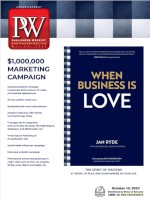I’m here today to preach to the choir, but sometimes a guy just needs to vent. In 1973, I was hired by the book division of R.R. Bowker (at the time also the home of Publishers Weekly) to publicize such sexy volumes as Books in Print and erudite tomes on librarianship. However, my first task was to work with Jean Peters, Bowker’s librarian, to set up a reception room display of banned books.
I don’t recall which we chose. Ulysses? The Well of Loneliness? The Grapes of Wrath? The project was both dismaying and rewarding. I had previously been only slightly aware of the movement to censor books.
Fifty years have past passed since Jean and I created that exhibition. If it were duplicated today, lamentably, it would be as germane now as it was then, and we would have many, many more titles to choose from. And let’s be clear: banning books is the moral equivalent of burning them. A few weeks ago, I remarked to my husband, a writer, “If your books were published in today’s environment, they would disappear.”
Permit me a short walk down memory lane. A couple of years after researching the history of book banning for that project, I left Bowker’s book side and slid into my dream job: reporting for the pages of PW. A few years after that, in 1977, Charles Hix, my partner of 15 years (and now husband), was approached by Hawthorn Books, a small indie house, to write a book on men’s grooming. He chose Looking Good for its title, named after the monthly column he wrote for Gentlemen’s Quarterly. He enlisted the then-little-known photographer Bruce Weber to supply scores of images of great-looking men. I cautioned Chuck that the book would likely follow the path of most: after publication, it would vanish, shortly to reappear on the remainder tables at Brentano’s.
Wrong. Looking Good found its place on bestseller lists at both the New York Times and PW, where it remained for weeks. Ten printings! Weber’s sensual photography contributed hugely to the success.
Several years later, Dan Green, then president of Simon & Schuster, convinced Chuck to tackle a male counterpart to the phenomenally successful Jane Fonda’s Workout Book. Chuck chose the title Working Out: The Total Shape-Up Guide for Men and brought aboard Ken Haak to supply scores of images of well-built men. Working Out was published in 1983 and stayed on the Times’ hardcover bestseller list for 21 weeks. Like Looking Good, it was a bestseller in trade paper as well.
For years after their publication, both books elicited many letters of gratitude from schoolboys and adults alike, thanking Chuck for addressing previously unaddressed topics—and, not coincidentally, for helping some understand their sexual orientation for the first time because of the ways in which they responded to the photographs.
To return to my original point: if today those two bestselling books found themselves in, say, a Southern state where the governor is apparently about to declare his presidential candidacy, they would not linger long. The contrived outrage of certain citizens would surely demand that they be banned in a nanosecond. Anger, whether real or feigned, is being amplified everywhere, and I am merely one of millions who is deeply concerned about this latest round of censorship.
So, I wish to send large bouquets of thanks to librarians and booksellers across the country for resisting the current groundswell of those believing that only books that adhere to their pinched ideas of truth and morality deserve to be available to all.
Looping back to that display of banned books again, it is embarrassing to admit that only a short time ago I finished reading, for the first time, John Steinbeck’s The Grapes of Wrath. In truth, I was occasionally bored, but more often depressed by the Joads’ soul-crushing tribulations. Mostly, I was in awe of Steinbeck’s creation. When I reached the very last paragraph, my eyes widened and my a-fib heart missed several beats. The concluding tableau is so amazing, so delicate, so moving, I shall never forget it.
Steinbeck concluded his masterpiece with a moment involving a bared breast that, sadly, would surely incense today’s angry armies of book banners. The incident depicted underscores the book’s underlying theme: we are not solely individuals. We are all part of the vastness of humanity, a concept abhorrent to large pockets of today’s wrathful American citizenry.
Robert Dahlin, a writer and editor, held several positions at Publishers Weekly before leaving as managing editor in 1983.



 Volume 270
Issue 21
05/22/2023
Volume 270
Issue 21
05/22/2023





